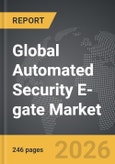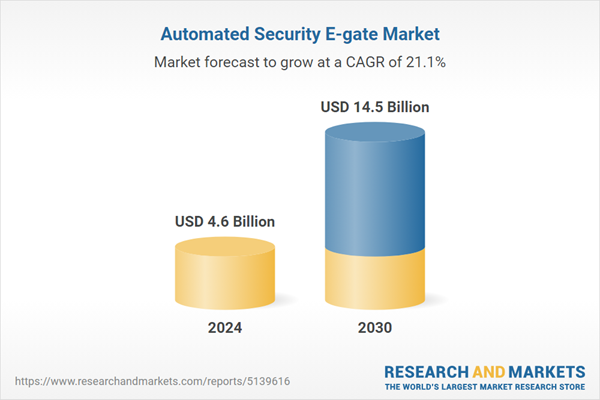Global Automated Security E-gate Market - Key Trends and Drivers Summarized
How Are Automated Security E-Gates Transforming Passenger Processing?
Automated Security E-gates have become an integral component of modern border control and airport security systems, revolutionizing the way passengers are processed at entry and exit points. These systems utilize a combination of biometric verification, such as facial recognition, fingerprint scanning, and iris recognition, along with advanced document authentication technologies to efficiently and securely verify the identity of travelers. Automated E-gates are designed to reduce the reliance on manual checks, which are not only time-consuming but also prone to human error. By automating the verification process, these gates enable faster and more accurate processing of large volumes of passengers, which is particularly critical in high-traffic areas like international airports. As global travel continues to rebound post-pandemic, the role of Automated Security E-gates in ensuring secure, seamless, and contactless passenger experiences has never been more significant. Their ability to enhance operational efficiency while maintaining stringent security standards makes them an essential asset for border control agencies worldwide.What Technological Advancements Are Enhancing E-Gate Systems?
The evolution of Automated Security E-gates is closely tied to advancements in biometric technology and artificial intelligence (AI). Modern E-gates are equipped with high-resolution cameras and sophisticated AI algorithms capable of real-time facial recognition, even in challenging lighting conditions and with various facial angles. The integration of AI not only improves the accuracy of identity verification but also enables continuous learning and adaptation, allowing the system to evolve and become more robust over time. Furthermore, the incorporation of multi-modal biometric systems, which use more than one biometric identifier (e.g., combining facial recognition with fingerprint scanning), significantly reduces the chances of false positives or identity fraud. In addition to biometrics, advancements in document scanning and optical character recognition (OCR) technologies have enhanced the speed and reliability of passport and ID card verification. These technological improvements are crucial for handling the growing volumes of travelers while minimizing security risks, thereby making Automated Security E-gates a cornerstone of future border control strategies.How Do Market Demands and Regulatory Pressures Influence E-Gate Adoption?
Consumer demand for quicker and more convenient travel experiences is one of the primary drivers behind the widespread adoption of Automated Security E-gates. With the increasing number of international travelers and the rising expectations for efficiency and convenience, airports and border control agencies are under pressure to adopt solutions that can handle high passenger throughput without compromising security. Moreover, the global pandemic has accelerated the demand for contactless processing technologies, where E-gates play a vital role in minimizing physical contact between passengers and security personnel. Regulatory pressures are also a significant factor influencing the adoption of these systems. Governments and international bodies like the International Civil Aviation Organization (ICAO) are setting stringent guidelines for border security, including the use of biometric verification and digital identity management. Compliance with these regulations is driving airports and border crossings to invest in state-of-the-art E-gate systems that meet or exceed these standards. The growing emphasis on safeguarding personal data and ensuring privacy has further led to the adoption of secure, encrypted systems that protect sensitive traveler information, adding another layer of complexity and sophistication to these technologies.What Factors Are Driving the Growth of the Automated Security E-Gate Market?
The growth in the Automated Security E-gate market is driven by several factors that reflect broader technological, regulatory, and consumer trends. The increasing global demand for efficient and secure border control solutions is a primary driver, particularly as international travel continues to recover and expand. The rise in biometric technology adoption, driven by advancements in AI and machine learning, is another critical factor, as these technologies enhance the capabilities of E-gate systems, making them more accurate and reliable. Additionally, the push for contactless processing in response to health concerns and the need to streamline operations in high-traffic areas is accelerating the deployment of Automated E-gates in airports and other border control points. Regulatory requirements mandating the use of biometric verification and the secure handling of personal data are also propelling market growth, as governments worldwide look to modernize their border security infrastructure. Furthermore, the increasing investment in smart city and smart airport projects, which integrate various automated systems for enhanced efficiency, is expanding the addressable market for E-gate solutions. The convergence of these factors ensures that the Automated Security E-gate market will continue to grow and evolve, driven by the need for more secure, efficient, and user-friendly border control solutions.Report Scope
The report analyzes the Automated Security E-gate market, presented in terms of market value (USD). The analysis covers the key segments and geographic regions outlined below.- Segments: Application (Critical Infrastructure Protection, Border Control).
- Geographic Regions/Countries: World; United States; Canada; Japan; China; Europe (France; Germany; Italy; United Kingdom; and Rest of Europe); Asia-Pacific; Rest of World.
Key Insights:
- Market Growth: Understand the significant growth trajectory of the Critical Infrastructure Protection Application segment, which is expected to reach US$9.8 Billion by 2030 with a CAGR of 21.7%. The Border Control Application segment is also set to grow at 19.8% CAGR over the analysis period.
- Regional Analysis: Gain insights into the U.S. market, valued at $1.3 Billion in 2024, and China, forecasted to grow at an impressive 20% CAGR to reach $2.2 Billion by 2030. Discover growth trends in other key regions, including Japan, Canada, Germany, and the Asia-Pacific.
Why You Should Buy This Report:
- Detailed Market Analysis: Access a thorough analysis of the Global Automated Security E-gate Market, covering all major geographic regions and market segments.
- Competitive Insights: Get an overview of the competitive landscape, including the market presence of major players across different geographies.
- Future Trends and Drivers: Understand the key trends and drivers shaping the future of the Global Automated Security E-gate Market.
- Actionable Insights: Benefit from actionable insights that can help you identify new revenue opportunities and make strategic business decisions.
Key Questions Answered:
- How is the Global Automated Security E-gate Market expected to evolve by 2030?
- What are the main drivers and restraints affecting the market?
- Which market segments will grow the most over the forecast period?
- How will market shares for different regions and segments change by 2030?
- Who are the leading players in the market, and what are their prospects?
Report Features:
- Comprehensive Market Data: Independent analysis of annual sales and market forecasts in US$ Million from 2024 to 2030.
- In-Depth Regional Analysis: Detailed insights into key markets, including the U.S., China, Japan, Canada, Europe, Asia-Pacific, Latin America, Middle East, and Africa.
- Company Profiles: Coverage of players such as Gemalto NV, HID Global Corporation, Josanti Infoimaging Ltd., NEC Corporation, OT-Morpho and more.
- Complimentary Updates: Receive free report updates for one year to keep you informed of the latest market developments.
Some of the 46 companies featured in this Automated Security E-gate market report include:
- Gemalto NV
- HID Global Corporation
- Josanti Infoimaging Ltd.
- NEC Corporation
- OT-Morpho
- Rapiscan Systems
- SITA
- Vision-Box
This edition integrates the latest global trade and economic shifts into comprehensive market analysis. Key updates include:
- Tariff and Trade Impact: Insights into global tariff negotiations across 180+ countries, with analysis of supply chain turbulence, sourcing disruptions, and geographic realignment. Special focus on 2025 as a pivotal year for trade tensions, including updated perspectives on the Trump-era tariffs.
- Adjusted Forecasts and Analytics: Revised global and regional market forecasts through 2030, incorporating tariff effects, economic uncertainty, and structural changes in globalization. Includes historical analysis from 2015 to 2023.
- Strategic Market Dynamics: Evaluation of revised market prospects, regional outlooks, and key economic indicators such as population and urbanization trends.
- Innovation & Technology Trends: Latest developments in product and process innovation, emerging technologies, and key industry drivers shaping the competitive landscape.
- Competitive Intelligence: Updated global market share estimates for 2025, competitive positioning of major players (Strong/Active/Niche/Trivial), and refined focus on leading global brands and core players.
- Expert Insight & Commentary: Strategic analysis from economists, trade experts, and domain specialists to contextualize market shifts and identify emerging opportunities.
Table of Contents
Companies Mentioned (Partial List)
A selection of companies mentioned in this report includes, but is not limited to:
- Gemalto NV
- HID Global Corporation
- Josanti Infoimaging Ltd.
- NEC Corporation
- OT-Morpho
- Rapiscan Systems
- SITA
- Vision-Box
Table Information
| Report Attribute | Details |
|---|---|
| No. of Pages | 246 |
| Published | January 2026 |
| Forecast Period | 2024 - 2030 |
| Estimated Market Value ( USD | $ 4.6 Billion |
| Forecasted Market Value ( USD | $ 14.5 Billion |
| Compound Annual Growth Rate | 21.1% |
| Regions Covered | Global |






![Automated Border Control Market by Solution Type (E-gates, Kiosks), Component Type [Hardware (Document Verification, Biometrics (Facial, Iris Recognition), Software, Services], Application (Airports, Seaports, Land Ports) - Global Forecast to 2030 - Product Image](http://www.researchandmarkets.com/product_images/12487/12487156_60px_jpg/automated_border_control_market.jpg)


